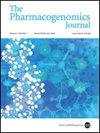Opportunities for personalizing colorectal cancer care: an analysis of SEER-medicare data
IF 2.9
3区 医学
Q2 GENETICS & HEREDITY
引用次数: 1
Abstract
United States clinical practice guidelines for metastatic colorectal cancer recommend use of medications impacted by genetic variants but do not recommend testing. We analyzed real-world treatment using a cancer registry and claims dataset to explore pharmacogenomic (PGx) medication treatment patterns and characterize exposure. In a cohort of 6957 patients, most (86.9%) were exposed to at least one chemotherapy medication with PGx guidelines. In a cohort of 2223 patients with retail pharmacy claims available, most (79.2%) were treated with at least one non-chemotherapy (79.2%) medication with PGx guidelines. PGx-associated chemotherapy exposure was associated with age, race/ethnicity, educational attainment, and rurality. PGx-associated non-chemotherapy exposure was associated with medication use and comorbidities. The potential impact of PGx testing is large and policies aimed at increasing PGx testing at diagnosis may impact treatment decisions for patients with metastatic colorectal cancer as most patients are exposed to medications with pharmacogenomics implications during treatment.

个性化大肠癌癌症护理的机会:SEER-Medicare数据分析
美国转移性结直肠癌临床实践指南建议使用受基因变异影响的药物,但不建议进行检测。我们利用癌症登记和理赔数据集分析了真实世界的治疗情况,以探索药物基因组学(PGx)药物治疗模式并描述暴露特征。在一组 6957 例患者中,大多数患者(86.9%)至少接触过一种符合 PGx 指南的化疗药物。在2223名有零售药店报销单的患者队列中,大多数患者(79.2%)接受了至少一种符合PGx指南的非化疗药物治疗(79.2%)。与 PGx 相关的化疗暴露与年龄、种族/民族、教育程度和农村地区有关。PGx相关的非化疗暴露与药物使用和合并症有关。PGx检测的潜在影响很大,旨在增加诊断时PGx检测的政策可能会影响转移性结直肠癌患者的治疗决策,因为大多数患者在治疗期间都会接触到具有药物基因组学影响的药物。
本文章由计算机程序翻译,如有差异,请以英文原文为准。
求助全文
约1分钟内获得全文
求助全文
来源期刊

Pharmacogenomics Journal
医学-药学
CiteScore
7.20
自引率
0.00%
发文量
35
审稿时长
6-12 weeks
期刊介绍:
The Pharmacogenomics Journal is a print and electronic journal, which is dedicated to the rapid publication of original research on pharmacogenomics and its clinical applications.
Key areas of coverage include:
Personalized medicine
Effects of genetic variability on drug toxicity and efficacy
Identification and functional characterization of polymorphisms relevant to drug action
Pharmacodynamic and pharmacokinetic variations and drug efficacy
Integration of new developments in the genome project and proteomics into clinical medicine, pharmacology, and therapeutics
Clinical applications of genomic science
Identification of novel genomic targets for drug development
Potential benefits of pharmacogenomics.
 求助内容:
求助内容: 应助结果提醒方式:
应助结果提醒方式:


